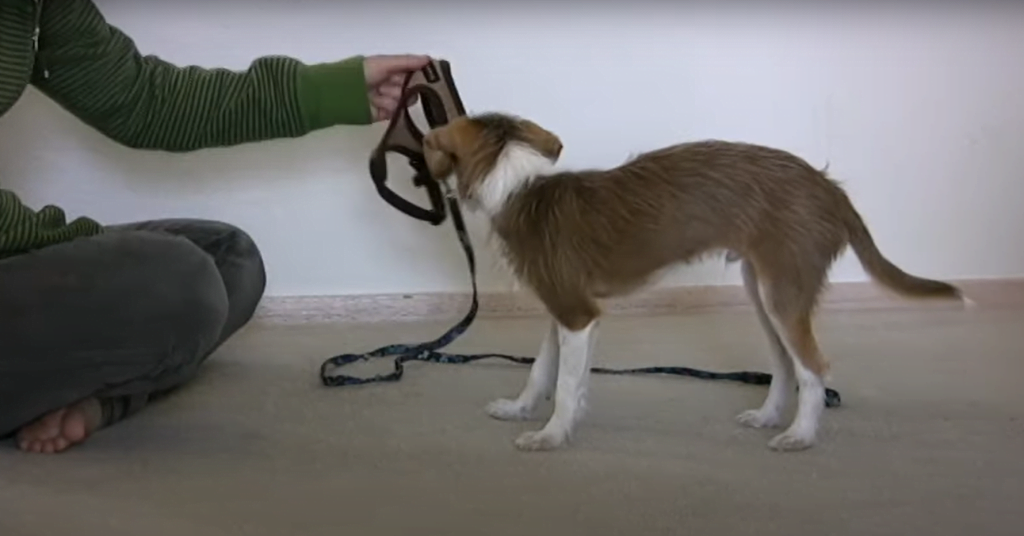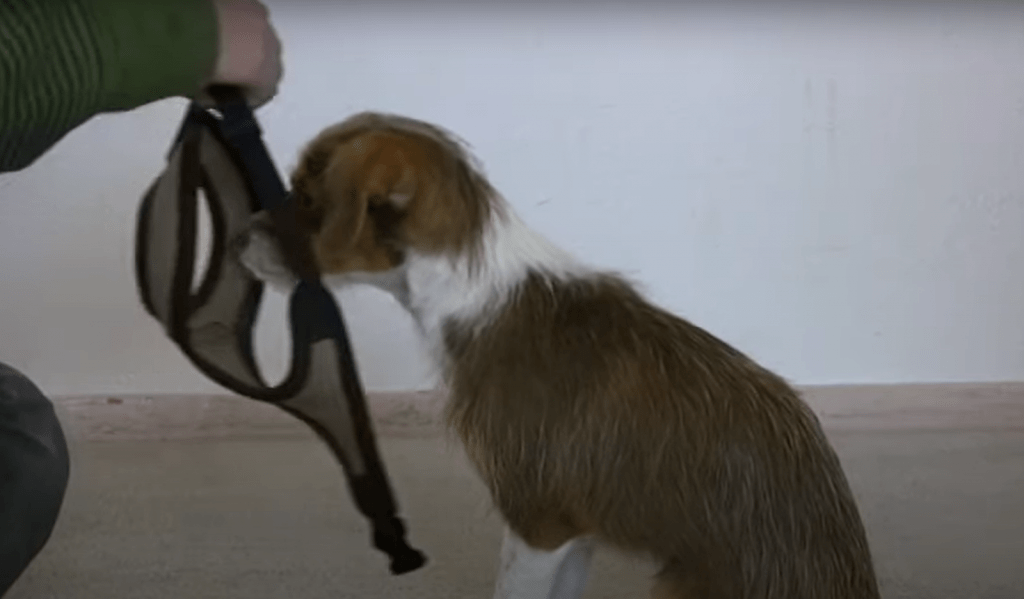Harnesses are a useful way to reduce the risk of neck injury, maximizing comfort and making walkies more enjoyable. You’ll still need to teach your dog to walk nicely on the leash so you can both walk together comfortably.
Taking the time to introduce your dog to wearing their harness in a kind, gentle, and fun way is likely to save you both a lot of stress in the long term, as your dog will learn to enjoy wearing their harness and reaping the benefits.

You can now start to move your hand backward away from the head-hole, with the treat ready in it as encouragement, so your dog has to push their nose and mouth through to enjoy their reward. If they’re not showing any signs of concern, you can continue to use treats to lure them through and let the harness hang gently around their neck while you continue to feed them. If they retreat, simply remove the harness straight away and go back to the stage.

Make sure your dog is comfortable with the noise of the clips first by simply clipping the harness up while you’re holding it, so they can hear the sound and you can see how they react. If they’re fine with that, then place the harness over their head, reward them with a treat, and then do up the clips around their body. Giving them tasty treats again straight afterward will be a good distraction for them and means they’re likely to associate having their harness done up with good things happening.

Once your dog has their harness on, get them used to wear it while they move about by encouraging them into activities that will distract them, such as playing a game with their favorite toy or doing some fun trick training such as sitting and giving a paw. If they’re comfortable, go out for a walk and, if they do need some more encouragement, give them a treat every now and then along the way.

If your dog is struggling with any stage of this training, simply go back to the stage before and continue for a little while longer to build their confidence before progressing again.
If you believe your dog to be worried by the harness or being handled in any way then stop. Always respond to your dog’s communication. so they know they can trust you. Signs that a dog might be worried about can be very subtle and easily missed.
If your dog is behaving in any way that worries you or shows any signs of aggression, please contact your vet to rule out any medical reason. Your vet can then refer you to a qualified behaviorist to help you further.
There are many different types of harnesses available but it’s important to choose carefully so your dog’s movement is not restricted in any way – for example, that there aren’t any straps that cross directly in front of the shoulders preventing natural movement.
Most harnesses require your dog to put their head through an opening, but you can find alternatives that clip around the neck and body which might be better for dogs who are a little head-shy.
Make sure your dog’s harness fits well – you should be able to fit a finger comfortably between the strapping and their body while they’re wearing it so there’s a little room for maneuver during movement, and they shouldn’t be able to slip out of it.
Remember that to comply with the law, when you are in public spaces you will need to make sure your dog also wears a dog collar, with an identity tag attached to it, even if you are walking them in their harness. It’s also worthwhile regularly checking your harness, collar, and leash for general wear and tear.
For an advanced tutorial training, there is a fantastic YouTube video from Sarah Walsh:
Wenn Sie diese Seite hilfreich fanden, denken Sie bitte darüber nach eine kleine Spende hinterlassen um uns dabei zu helfen, nützlichere Ratschläge zu erstellen.
Das können Sie auch Melden Sie sich für unseren kostenlosen Newsletter an Für weitere Tipps und Tricks und um über unsere Arbeit auf dem Laufenden zu bleiben.
| Plätzchen | Dauer | Beschreibung |
|---|---|---|
| cookielawinfo-checkbox-analytics | 11 Monate | This cookie is set by GDPR Cookie Consent plugin. The cookie is used to store the user consent for the cookies in the category "Analytics". |
| cookielawinfo-checkbox-funktional | 11 Monate | The cookie is set by GDPR cookie consent to record the user consent for the cookies in the category "Functional". |
| cookielawinfo-checkbox-notwendig | 11 Monate | This cookie is set by GDPR Cookie Consent plugin. The cookies is used to store the user consent for the cookies in the category "Necessary". |
| cookielawinfo-checkbox-others | 11 Monate | This cookie is set by GDPR Cookie Consent plugin. The cookie is used to store the user consent for the cookies in the category "Other. |
| cookielawinfo-checkbox-performance | 11 Monate | This cookie is set by GDPR Cookie Consent plugin. The cookie is used to store the user consent for the cookies in the category "Performance". |
| angesehene_cookie_policy | 11 Monate | Das Cookie wird vom DSGVO-Plugin „Cookie Consent“ gesetzt und dient dazu, zu speichern, ob der Benutzer der Verwendung von Cookies zugestimmt hat oder nicht. Es werden keine personenbezogenen Daten gespeichert. |